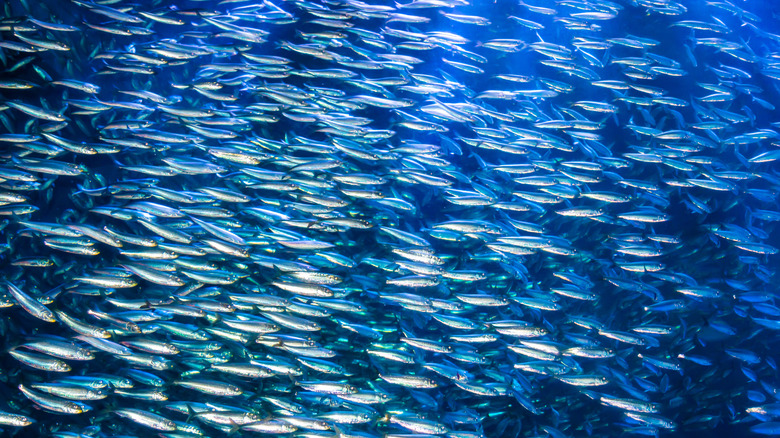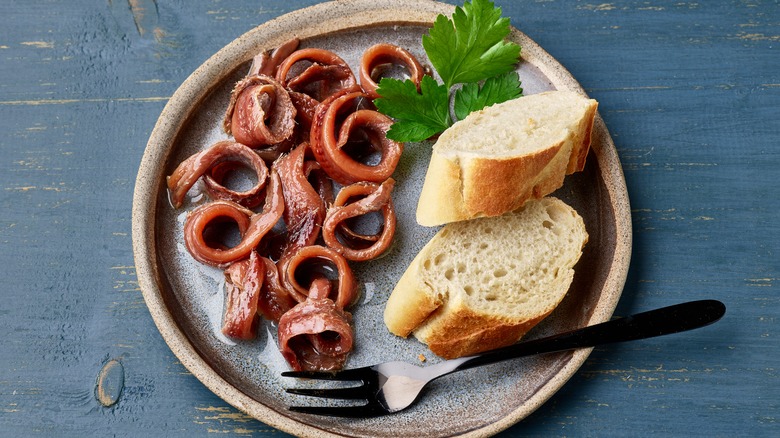The Fishy Ingredient Bobby Flay Can't Stop Using
When you cook all the time, whether it's for a living or for fun, all that time in the kitchen means freedom to experiment with flavor combinations. You're bound to discover unexpected pairings worth repeating (hey, strawberries and balsamic vinegar and coffee-rubbed steak had to start somewhere). Maybe your family's deviled egg recipe is elevated by a squirt of Dijon mustard, or you know that one home cook who sneaks chocolate into their beef chili. Cook often enough and you might find yourself continually reaching for so-called "secret ingredients" you can't go without. Most of the pros do it, reveals The Guardian — it might be as subtle as a splash of vinegar or as bold as chili oil.
Celebrity chef Bobby Flay has just such a secret culinary weapon, which adds dimension to foods as commonplace as Caesar salad, Worcestershire sauce, per Insider, and puttanesca sauce. On the other side of the pond, states Metropolitan Barcelona, it's a mainstay of Mediterranean cuisine. In fact, it's been eaten for thousands of years, and for good reasons: big nutrition according to Healthline, as well as intensely salty umami flavor. Yet the first (and regrettably, only) time many Americans encounter this indispensable ingredient is in the form of the country's least favorite pizza topping, per Food & Wine: an unchecked option on the lid of the box. Are you wrinkling your nose or nodding appreciatively in recognition yet?
Why every pantry should include anchovies
The answer is anchovies, a so-called "forage fish," according to the NOAA, that is packed with goodness — in terms of flavor and nutrition. The USDA reports that just 2 ounces of anchovies canned in oil provide 13 grams of protein, 4 grams of fat, 16% of your daily recommended intake of vitamin B12, and over half your recommended daily intake of vitamin B3 (niacin) and selenium. They're also carb-free, with a high concentration of iron and calcium, and brimming with omega-3 fatty acids, adds Healthline.
In addition, anchovies accumulate lower levels of mercury than larger fish — like tuna — can, making them a safer choice for your diet, as illustrated by the Food and Drug Administration. If you're not sold yet, these tiny creatures are also a sustainable seafood choice. Compared to larger species, they are fished using methods with a lower ecological impact, according to The New York Times – in fact, consuming more fish from the bottom of the food chain may actually help return ecosystems to equilibrium.
In a world where the oceans are increasingly overfished, per the Food and Agriculture Organization of the United Nations, our seafood choices are becoming more consequential. Anchovies offer bang for your buck — the widely appreciated taste and health benefits of seafood concentrated in a small package. And you can enjoy anchovies knowing that so far, anchovy stocks remain abundant, according to the NOAA.
How to use anchovies like Bobby Flay
Anchovies add a savory flavor and brininess that echoes the waters they call home, but they won't make your whole dish taste like fish, Roland Foods assures. You'll find anchovies in small tins or jars in the grocery store; they may be packed in salt, oil, or water and come in myriad brands and price ranges. In a can of anchovies, expect layers of red, itty-bitty, bone-in fillets. You can eat just about the whole shebang: The larger salt-packed anchovies should be deboned and rinsed first, per Food and Wine, but the skin is edible. Another option is anchovy paste, made with ground anchovies.
On his Food Network show "Beat Bobby Flay," the celebrity chef once called anchovies "the bacon of the sea." He explains that the fish melt into sauces and other dishes, providing their salty, meaty flavor in a similar but actually more versatile way than brittle bacon does. In an interview with Misfits Market, as reported by People, Flay revealed that he even adds anchovies to existing seafood dishes to deepen their flavor.
Other Flay recipes making use of the functional fish include anchovy butter, fettuccine, and even mac and cheese. Furthermore, BBC Food suggests incorporating them into spreads or adding them to meat marinades for a little complexity. Just make sure you refrigerate your opened anchovies and use them within one week, advises Food and Wine. With so many applications and benefits, though, they'll likely be gone before then.


